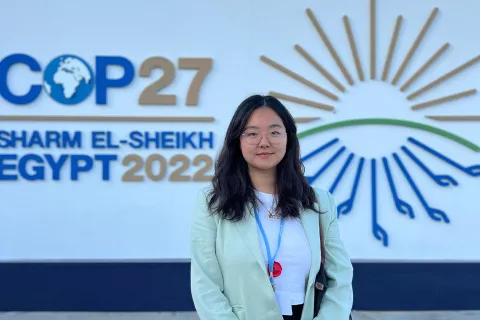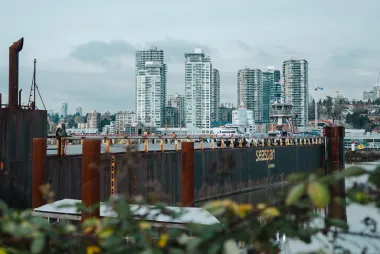Collective action on climate change: reflections on COP27 and beyond

This UBC Climate Emergency Week, we touched base with COP27 attendee and third-year materials engineering student Rynn Zhang on why our climate future depends on collective action.
You were an official independent observer alongside other UBC delegates to the biggest and most important annual climate-related conference. This is a crucial opportunity for 197 nations and territories to discuss other nations’ plans to reduce greenhouse gas emissions in the next year. What were your hopes and expectations going into COP27?
I came into COP27 hoping to hear youth voices and perspectives amplified on the global stage. I also wanted to see progress made on the loss and damage funding facility, which basically provides funding to countries that are most vulnerable to the effects of climate change, particularly in the Global South.
I’m very happy to report that although the funding is not operational yet, it now exists and there’s been movement made - a positive step towards climate justice.
The goal for COP27 was to focus on helping economically developing nations in their transition to phasing out fossil fuels and implementing renewable energy. At COP26, many countries made ambitious goals to cut their own fossil fuel emissions. What progress do you see from Canada?
Canada joined the Global Shield program at COP27, which will provide $7 million as a form of insurance to vulnerable countries facing climate disasters out of its pre-existing $5.3 billion climate finance commitment.
Canada also announced they would be investing $84.3 million in practical initiatives to combat the impacts of climate change. Moreover, an additional $16 million will be allocated to support the World Bank’s Partnership for Market Implementation.
Were Indigenous voices and collaborators a part of the conversation at COP27?
Yes and no. I believe that Indigenous perspectives were not represented as much as they should have been. While there were several Canadian Pavilion events that highlighted Indigenous groups, I saw little movement made on how the "just" energy transition would consider Indigenous ways of knowing. Indigenous groups should have been given more space for delegates on the Canadian negotiation team to ensure that their voices are heard and their land is protected.
What were your overall impressions and main takeaways? What are the next steps that we need to take?
My overall takeaway was recognizing Canada's contribution and positionality relative to the climate crisis. Canada emits the highest amount of greenhouse gas emissions per capita in the entire world and what we do here in Canada is resulting in negative climate impacts in the Global South. Getting the opportunity to attend COP27 was an extremely eye-opening and humbling experience. I was incredibly grateful to be able to witness and be immersed in this international process and I left feeling more empowered to use my voice as a student and an emerging professional.
As a materials engineering student, being able to hear certain topics discussed and showcased at the conference that I’ve previously learned about through my degree, such as innovative technologies being developed around concrete, aluminium smelting, hydrogen production, and waste treatment was really encouraging for me.
I was also reminded that taking climate action isn't fully dependent on diplomats and politicians. Action needs to be taken collectively, as students, engineers, scientists, researchers, community leaders, investors, and activists. Climate change will affect everyone's lives and everyone's lives can affect climate change as well.
Your voice matters. Your story matters. Your action matters.


